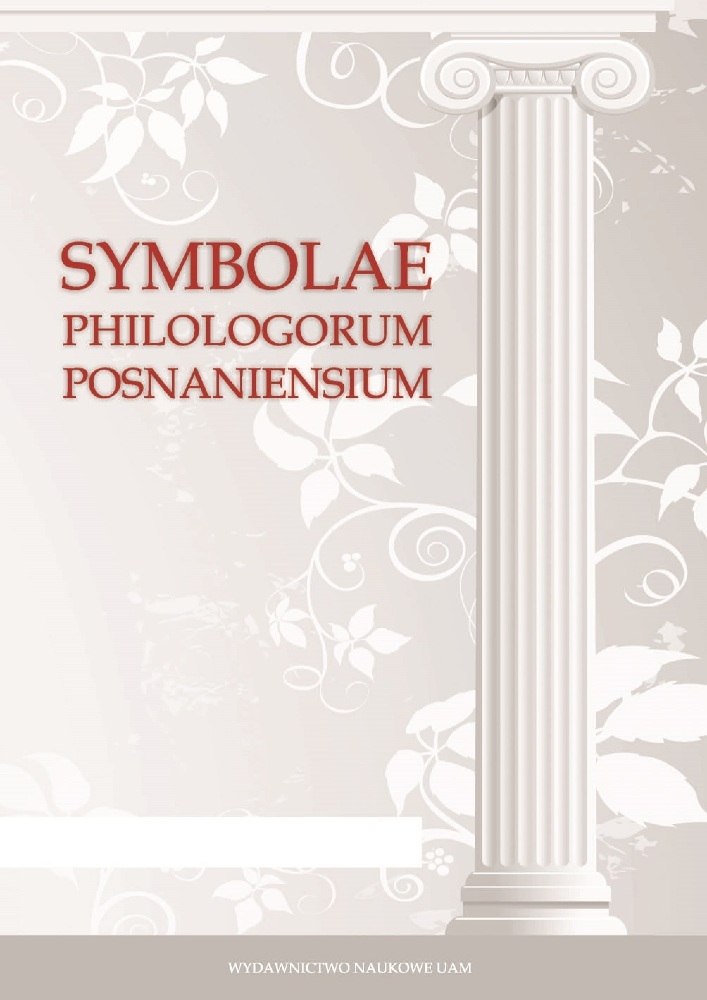Abstract
The purpose of this paper is to show how Middle Comedy authors re-work mythical motifs and characters borrowed from Homer’s epic poetry, inserting them into the various contexts of everyday life and imbuing them with new meaning. The analysis focuses on the fragments of plays by Anaxilas and Ephippus, which draw on the motif of animal transformation and of Odysseus’ encounter with Circe and mythical monsters.References
Arnott 1996: Arnott, W.G. 1996. Alexis: The Fragments. A Commentary. Cambridge: Cambridge UP.
Athenaeus 2006–2012: Athenaeus. 2006–2012. The Learned Banqueters. Ed., transl. by S.D. Olson. Cambridge (Mass.)-London: Harvard UP.
Bakola 2010: Bakola, E. 2010. Cratinus and the Art of Comedy. Oxford: Oxford UP.
Bartol, Danielewicz 2011: Bartol, K., Danielewicz, J. 2011. Komedia grecka od Epicharma do Menandra. Warszawa: Wydawnictwo Naukowe PWN.
Bergk 1838: Bergk, Th.B. 1838. Commentationum de reliquiis comoediae Atticae libri duo. Lipsiae: Koehler.
Borowicz, Hobot, Przybylska 2010: Borowicz, S., Hobot, J., Przybylska, R. 2010. Stara rebeliantka. Studia nad semantyką obrazu. Kraków: Wydawnictwo Uniwersytetu Jagiellońskiego.
Bowie 2010: Bowie, A.M. 2010. Myth and Ritual in Comedy. In Brill’s Companion to the Study of Greek Comedy. Ed. by G. Dobrov. 143–178. Leiden–Boston: Brill.
Casolari 2003: Casolari, F. 2003. Die Mythentravestie in der griechischen Komödie. Münster: Aschendorff Verlag.
Dickie 2003: Dickie, M.W. 2003. Magic and Magicians in the Greco-Roman World. London–New York: Routledge.
Dutsch 2008: Dutsch, D.M. 2008. Feminine Discourse in Roman Comedy. On Echoes and Voices. Oxford Studies in Classical Literature and Gender Theory. Oxford-New York: Oxford UP.
Hammond 2000: Homer. 2000. The Odyssey. Transl. by M. Hammond. London: Duckworth.
Hawes 2014: Hawes, G. 2014. Rationalizing Myth in Antiquity. Oxford: Oxford UP.
Hunter 1979: Hunter, R.L. 1979. “The Comic Chorus in the Fourth Century.” Zeitschrift für Papyrologie und Epigraphik 36: 23–38.
Jouanno 2012: Jouanno, C. 2012. “Images comiques d’Ulysse, d’Épicharme à Plaute.” Les Études Classiques 80: 247–282.
Kassel, Austin 1983–2001: Kassel, R., Austin, C. 1983–2001. Poetae Comici Graeci. Vol. I-VIII. Berolini-Novi Eboraci: De Gruyter.
Keiser 1964: Keiser, E. 1964. “Odyssee-Szenen als Topoi.” Museum Helveticum 21: 109–136; 197–224.
LSJ 1996: A Greek-English Lexicon. Ed. by H.G. Lidell and R. Scott, rev. by Sir H.S. Jones. Oxford: Clarendon Press.
Meineke 1839–1857: Meineke, A. 1839–1857. Fragmenta Comicorum Graecorum, collegit et disposuit. Vol. I-V. Berolini: Reimer.
Nesselrath 1990: Nesselrath, H.-G. 1990. Die Attische Mittlere Komödie. Ihre Stellung in der antiken Literaturkritik und Literaturgeschichte. Berlin-New York: De Gruyter.
Olson 2007: Olson, S.D. 2007. Broken Laughter. Select Fragments of Greek Comedy. Oxford: Oxford UP.
Papaioannou 2016: Papaioannou, S. 2016. “Plautus Undoing Himself – What is Funny and What is Plautine in Stichus and Trinummus?” In Roman Drama and its Contexts. Ed. by S. Frangoulidis, S. J. Harrison, G. Manuwald, 167–202. Berlin: De Gruyter.
Phillips 1959: Phillips, E.D. 1959. “The Comic Odysseus.” Greece and Rome 6: 58–67.
Thorburn 2005: Thorburn, J.E. Jr. 2005. The Facts on File. Companion to Classical Drama. New York: Facts on File.
Webster 1970: Webster, T.B.L. 1970. Studies in Later Greek Comedy. Manchester: Manchester UP.
Wilkins 2000: Wilkins, J. 2000. The Boastful Chef. The Discourse of Food in Ancient Greek Comedy. Oxford: Oxford UP.
Zimmermann 2006: Zimmermann, B. 2006. Die griechische Komödie. Frankfurt am Main: Verlag Antike.
License
